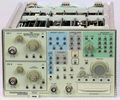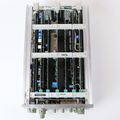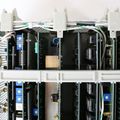7D20: Difference between revisions
(creation) |
No edit summary |
||
| (42 intermediate revisions by 4 users not shown) | |||
| Line 1: | Line 1: | ||
The Tektronix 7D20 is a two-channel digitizing plug-in for 7000-series | {{Plugin Sidebar | ||
|manufacturer=Tektronix | |||
|series=7000-series scopes | |||
|type=7D20 | |||
|summary=70 MHz dual-channel digitizer | |||
|image=tek-7603-7d20.jpg | |||
|caption=7D20 in [[7603]] mainframe | |||
|introduced=1982 | |||
|discontinued=1992 | |||
|manuals= | |||
* [[Media:070-3205-01.pdf|Tektronix 7D20 Reference Guide]] | |||
* [[Media:070-3857-01.pdf|Tektronix 7D20 Operators Manual]] (OCR) | |||
* [[Media:070-3858-01.pdf|Tektronix 7D20 Service Manual]] (OCR, split schematics, standard resolution) | |||
* [[Media:070-3858-01 lowres.pdf|Tektronix 7D20 Service Manual]] (OCR, whole schematics, low resolution) | |||
* [[Media:070-1728-00.pdf|Tektronix 7D20 Interfacing Guide]] | |||
* [[Media:7D20 SMPS AnalysisDFT Apr1984.pdf|EDN Article by Clark Foley and Jim Lamb on SMPS diagnosis featuring the 7D20]] | |||
{{ROM Images}} | |||
* U200: [[Media:160-1164-02.bin|160-1164-02]] | |||
* U300: [[Media:160-1165-02.bin|160-1165-02]] | |||
* U400: [[Media:160-1163-02.bin|160-1163-02]] | |||
* U500: [[Media:160-1162-03.bin|160-1162-03]] | |||
* U600: [[Media:160-1676-02.bin|160-1676-02]] | |||
* U700: [[Media:160-1757-03.bin|160-1757-03]] | |||
}} | |||
The '''Tektronix 7D20''' is a two-channel digitizing plug-in for [[7000-series scopes]]. It is a triple-width plug-in and provides both vertical and horizontal signals to the scope. The 7D20 can digitally store waveforms and has a [[GPIB interface]]. | |||
A special version of the rackmount large screen [[R7603]] exists (Opt. 20), which provides a rear-panel [[GPIB]] connector to be used with the 7D20. | |||
{{BeginSpecs}} | |||
{{Spec| Bandwidth | 0–70 MHz (DC), 10 Hz–70 MHz (AC) }} | |||
{{Spec| Rise time | < 5 ns }} | |||
{{Spec| Sampling Rate | 40 MSps }} | |||
{{Spec| Resolution | 8 bit }} | |||
{{Spec| Deflection | 5 mV/Div to 5 V/Div (1–2–5) }} | |||
{{Spec| Input impedance | 1 MΩ // 20 pF }} | |||
{{Spec| Time base | | |||
* 50 ns/Div — 1 μs/Div: Equivalent Time Mode | |||
* 2 μs/Div — 200 μs/Div: Extended Real Time Mode | |||
* 500 μs/Div — 50 ms/Div: Real Time Mode | |||
* 100 ms/Div — 20 s/Div and External: Roll Mode | |||
}} | |||
{{Spec| External clock | < 10 kHz }} | |||
{{Spec| Memory | 2 × 455 cells (alternating) analog / 1024 words digital }} | |||
{{Spec| Features | | |||
* 2 channels | |||
* 6 memory banks | |||
* 2 cursors | |||
}} | |||
{{Spec| Weight | 3.9 kg (8.5 lb) }} | |||
{{EndSpecs}} | |||
==Internals== | |||
The 7D20 uses an analog shift register (CCD) for high-speed signal acquisition, and then digitizes the stored analog signal at a lower speed (see [[Patent US 4527117A]]). This design allowed the 7D20 to capture single-shot events at 40 MSamples/s even though this exceeded the speed of ADCs of the time. A microprocessor ([[Motorola 6809|68B09]]) in the plug-in controls most of its functions. | |||
The analog waveforms that are sent to the 7000-series mainframe are generated by vertical and horizontal DACs. The DACs outputs can be calibrated for scaling and shift so that signals are accurately displayed on the oscilloscope screen. | |||
The 7D20 has a "roll" mode that emulates a paper roll chart, as if the waveform were being drawn by a pen on the right side of the screen while the paper is being moved to the left at a constant rate. No equivalent to "roll" exists in analog scopes. The Tektronix [[2212]]/[[2216]], [[2220]]/[[2221]]/[[2230]] and possibly others also have this feature. | |||
The 7D20 can give [[NVRAM errors]] that are often easy to fix. | |||
==Links== | |||
* [http://amplifier.cd/Test_Equipment/Tektronix/Tektronix_7000_series_special/scope_7D20.htm 7D20 page @ amplifier.cd] | |||
* [http://www.jvgavila.com/tek7603.htm EB5AGV's Tektronix R7603 / 7D20 page] - 7D20+[[R7603]] Repair Report | |||
* [http://pcbunn.cithep.caltech.edu/jjb/tektronix/7D20/tektronix_7d20.htm Another 7D20 repair] | |||
* [http://www.barrytech.com/tektronix/tek7000/tek7d20.html 7D20 @ barrytech.com] | |||
==Pictures== | |||
<gallery> | |||
tek-7603-7d20.jpg | |||
7d20 plugin.jpg | |||
Tek 7d20 1.jpg | |||
Tek7d20.jpg | |||
7d20-manual.jpg | 7D20 picture from manual | |||
7d20-in-mf-manual.jpg| 7D20 picture in 7603 mainframe, from manual | |||
Tek 7d20 rear.jpg | |||
Tek 7d20 2.jpg | |||
Tek 7d20 3.jpg | |||
Tek 7d20 4.jpg | |||
Tek 7d20 5.jpg | |||
Tek 7d20 6.jpg | |||
Tek 7d20 7.jpg | |||
Tek 7d20 8.jpg | |||
Tek 7d20 9.jpg | |||
</gallery> | |||
==Parts== | |||
{{Parts|7D20}} | |||
[[Category:7000 series combined plugins]] | |||
[[Category:Digital storage scopes]] | |||
[[Category:GPIB interface]] | |||
Latest revision as of 08:57, 7 December 2023
The Tektronix 7D20 is a two-channel digitizing plug-in for 7000-series scopes. It is a triple-width plug-in and provides both vertical and horizontal signals to the scope. The 7D20 can digitally store waveforms and has a GPIB interface.
A special version of the rackmount large screen R7603 exists (Opt. 20), which provides a rear-panel GPIB connector to be used with the 7D20.
Key Specifications
| Bandwidth | 0–70 MHz (DC), 10 Hz–70 MHz (AC) |
|---|---|
| Rise time | < 5 ns |
| Sampling Rate | 40 MSps |
| Resolution | 8 bit |
| Deflection | 5 mV/Div to 5 V/Div (1–2–5) |
| Input impedance | 1 MΩ // 20 pF |
| Time base |
|
| External clock | < 10 kHz |
| Memory | 2 × 455 cells (alternating) analog / 1024 words digital |
| Features |
|
| Weight | 3.9 kg (8.5 lb) |
Internals
The 7D20 uses an analog shift register (CCD) for high-speed signal acquisition, and then digitizes the stored analog signal at a lower speed (see Patent US 4527117A). This design allowed the 7D20 to capture single-shot events at 40 MSamples/s even though this exceeded the speed of ADCs of the time. A microprocessor (68B09) in the plug-in controls most of its functions.
The analog waveforms that are sent to the 7000-series mainframe are generated by vertical and horizontal DACs. The DACs outputs can be calibrated for scaling and shift so that signals are accurately displayed on the oscilloscope screen.
The 7D20 has a "roll" mode that emulates a paper roll chart, as if the waveform were being drawn by a pen on the right side of the screen while the paper is being moved to the left at a constant rate. No equivalent to "roll" exists in analog scopes. The Tektronix 2212/2216, 2220/2221/2230 and possibly others also have this feature.
The 7D20 can give NVRAM errors that are often easy to fix.
Links
- 7D20 page @ amplifier.cd
- EB5AGV's Tektronix R7603 / 7D20 page - 7D20+R7603 Repair Report
- Another 7D20 repair
- 7D20 @ barrytech.com
Pictures
-
-
-
-
-
7D20 picture from manual
-
7D20 picture in 7603 mainframe, from manual
-
-
-
-
-
-
-
-
-
Parts
Some Parts Used in the 7D20
| Part | Part Number(s) | Class | Description | Used in |
|---|---|---|---|---|
| 155-0196-00 | 155-0196-00 | Monolithic integrated circuit | trigger | 455 • 7D20 |
| 155-0217-00 | 155-0216-00 • 155-0217-00 | Monolithic integrated circuit | variable-gain transconductance amplifier | 335 • 475 • 7D20 • FG504 |
| 2N3958 | 151-1054-00 • 151-1054-01 • 151-1054-02 | Discrete component | dual n-channel JFET | FG503 • MR501 • M3 • PG505 • SC501 • SC502 • SC503 • SG502 • 1450 • 1501 • 1502 • 1503 • 221 • 5A23N • 5CT1N • 577 • 603 • 603A • 604 • 604A • 605 • 606 • 606A • 606B • 607 • 607A • 620 • 624 • 7CT1N • 7D15 • 7D20 • 851 |
| Motorola 6809 | 156-1494-00 • 156-1494-01 | Monolithic integrated circuit | 8-bit microprocessor | 2424L • 2440 • 7D20 • DM5120 • DM5520 • Keithley 193A • Keithley 196 • Keithley 199 |















